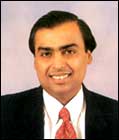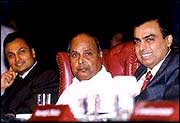Home > Business > Special
Ambani to make Reliance Info 'the Maruti of the telecom world'
Haseeb Drabu and Arijit De |
December 28, 2002
Is Reliance Group Chairman Mukesh Ambani becoming a trace arrogant?
 As the Reliance Group launches its most ambitious project ever, he is dismissive about the competition: not because of his strengths but because of their weaknesses.
As the Reliance Group launches its most ambitious project ever, he is dismissive about the competition: not because of his strengths but because of their weaknesses.
He doesn't believe they are anywhere close to him and they aren't about to catch up.
If there is a trace of arrogance in all this, it is perhaps understandable. Mukesh has been setting up mega-projects -- each bigger than the other -- since he was 22.
He cut his project building skills at Patalganga and then moved on to Hazira. Then came the Jamnagar refinery, which was again bigger than the two before it.
This week it is Reliance Infocomm, the giant project that aims at turning the group into the 'Maruti of the telecom world.'
When the switch was turned on on Friday, telephone users in 400 cities had a new choice before them. The best part is that Reliance is playing the role of a price warrior.
Certainly, Reliance, under Mukesh, is being innovative as it makes its Big Bang entry into the telecom sector.
Take the distribution system that it is putting into place in 600 cities. The Dhirubhai Ambani Entrepreneurship Scheme aims to cut capital deployment and distribution cost.
Says Mukesh: "We decided to train young people under the DA Entrepreneurship programme and open the entire service sector portfolio to them." There is, of course, a catch for the young entrepreneurs: "He does not get paid if he does not get subscribers."
While every single idea and every new foray that Reliance has made till now is still being attributed to 'Papa' -- that phrase is used about 50 times in 100 minutes -- it is impossible for anyone who has tracked the growth of Reliance not to see the basic change: If the father used the regulatory system, the son is working the market system.
The new forays may be based on the 'ideas' of the founder chairman, they will be executed according to the new chairman's understanding of how the new market oriented regime works and what it demands.
This is the basic change in the group and everything else --from ethics to strategy to use of technology -- falls into place automatically.
Mukesh is today not looking at the competition; he is focused on the consumer; and in the spirit of globalisation, while the consumer may at present be a domestic one, Mukesh's mind has moved ahead to look for and acquire the global consumer.
The corporate benchmarks have gone global too. Indeed, he is almost offended when he is compared to other Indian companies.
"As I see it, I am at the bottom of the global ladder, not at the top of the Indian ladder. I am a pigmy when compared to the global players."
The future course is pretty much charted out.
Increasingly, Reliance's earlier strategy of backward integration has run its course; now it is into diversification and conquering new markets.
Whatever gains had to be made from vertical integration have been extracted fully; now, in a global environment, it could be excess baggage.
Following the shift in paradigm, there is a radical change in the way business is being thought of. There is hardly any talk of 'market shares', or being 'number one' or 'two' in a particular line of business that was the guiding principle not so long ago. Explaining the new approach, Ambani says, "Now the fundamental framework of business is to take a share of the wallet of an individual. We think that both information and communication and energy are essentials for every individual living in today's world. That is what we are really pursuing!"
It is this pursuit which has resulted in the controversial pricing strategy that most competitors feel is predatory.
 But the game plan is not very different from what Reliance has used successfully for decades: pushing volumes into the market to drive down prices.
But the game plan is not very different from what Reliance has used successfully for decades: pushing volumes into the market to drive down prices.
Only, this time, instead of polymers or polyester or diesel and petrol, it will be bandwidth.
As he puts it, "Our server capacity, processing power, at the time of initial launch is five times that of all networks put together in India. I believe that we will go up to 50 times as we will give service."
The much talked about pricing has reversed the logic of price making in the industry.
No longer is Ambani talking of a cost plus price model and then cutting prices by squeezing margins; opting for lower profits or bearing losses and matching the depth of his pockets and survival stamina with that of his rivals.
The logic has been inverted. As he explains, "When we started our mobile -- he always refers to it as mobile, showing scant regard for the fact that it has only limited mobility -- we thought what an Indian customer can afford. And then we worked back to provide a service in that."
Ambani is eager to paint the bigger picture.
"Most outsiders, when they talk about the infocom business, say how cheap or how affordable it will be. It is just the tip of the iceberg. The bigger plan is to create a connectivity environment around people: in mobile, the home space as well as in the office. We are into connectivity because it will be the bedrock in terms of delivering value across businesses."
"The Indian economy has the highest potential to improve productivity by simple connectivity, primarily because we have a large amount of inefficiencies in our system. In simple words the transaction costs are very high. So wherever the transaction cost is high and you put in connectivity and on top of that you put in simple application, you are really changing the rules of the game."
And that's for sure. Reliance has changed the telecom landscape of the country.
As he sees it, "Packed into a hand set are the main ingredients of three revolutions -- mobile, broadband and covergence -- which will empower the customer. Besides voice, the Java enabled applications would allow customers to watch films, and get pop3 mails. The user can put in any programme. In short, it is a hand-held computer."
"If you move to enterprises, you leapfrog people who have never used a PC, and give them applications so that they can plug in. And when you talk of homes, it is really the ethernet technology that we would take to the homes," he adds.
The message is clear: prices and tariffs are not the real issues nor are these what make the Reliance Infocomm service different.
Indeed, with Reliance doubling its rates to 40 paise per minute on TRAI orders, they are at par with other WiLL operators, like Tata Teleservices.
This hike will not change his basic numbers. For, having worked the 'affordable' price, the next thing which Dhirubhai got Mukesh to tell him was 'how to make money on that.'
It was the answer to that question, Mukesh says, which 'formed the framework of our company.' "We used the 'postcard price' norm and said okay let's challenge ourselves. We want to build a network where everyone across India can talk to each other for the price of a postcard."
It is here that the choice of CDMA came in, Ambani explains.
"Why I used CDMA is that it is built in a cost framework. I have to deliver a minute cost and still make money. Which gives me large capacity -- CDMA does? And since in our revenue model we actually worked backwards from the customers, we said we do not want the customer to pay more than Rs 500 a month. We cannot afford Rs 1,500 customer acquisition cost. We just can't afford it. It needs to be brought to Rs 400. But how do you do that and still deliver value and make money?"
What came in handy was Reliance's timing. Multinational telecom vendors were faced with a major glut the world over.
Mukesh's team bargained hard to drive down the prices at which Reliance Infocomm bought its equipment to set up the massive 60,000 km optic fibre network. Due to the low cost base, the service could be aggressively priced.
Not just that, Ambani says he should not be making losses even in the first year of operations! Mukesh's war cry to the MNC-dominated rivals is short and simple: "Aa ja, dekh le!" (Come on, we will take you on!)
"Revenue comes from connectivity and from application on demand. If people have invested Rs 100 in a mobile network, we need 25 per cent return, that is Rs 25 at the end of year. If our operating cost is Rs 5 that becomes Rs 30 and if this network will serve 30 people, then we say Re 1 for each person. That is the cost. Over and above that if we charge for any information as he uses it, then it becomes incremental revenue. This will give me a pay back time of four years."
In addition to all this was the novel distribution scheme. The ambition is to reach 2,000 cities. Says Mukesh: "For this we need large distribution muscle in every city, which is city specific, local and we need to integrate these into one uniform platform."
But even as he works towards institutionalising his father's mode of thinking, he is very clear that he needs to move away from the 'less than clean' image that the group has had so far.
He candidly admits that "it is difficult to say about the '80s and '90s. May be in the 1980s we were not perfect. There were trials and tribulations. I think we are now the trustees of the people. While our fundamentals and beliefs remain the same, we are trying to be more articulate and the perception will change."
Another perception, at a personal level, that Mukesh Ambani wants to change is that of a complete workaholic who has little time for family matters.
As he says, "I will be hands-on on this project for the next six months. After that I will take one year off and be with my kids. They need this more intensive kind of attention."
Powered by 
Reliance set to revolutionise mobile services
Fight me on price, Mukesh tells rivals
Reliance rivals play it cool
Reliance Info eyes 1mn subscribers a month
Reliance Info targets 15-20% market share by '04
Plan 2004: Reliance to turn multinational
More Specials